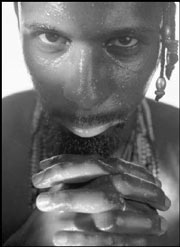THE OMAR SOSA OCTET
On the Boards, 217-9888, $18 8 p.m. Sat., April 13
CHANTING, RAPPING, prayer, fields of percussion, jazz chords, Moroccan rhythm, classical European flourishes, Venezuelan folk melodies . . . entering Omar Sosa’s realm is disorienting. Much “world music” is smoothly refined, an ethnic export that blurs away cultural differences with easy danceability. But Sosa makes no concession to packaging—note by note, he eludes capture. His piano solos abruptly diverge from the expected payoff; his rhythms shift in place—or charge forward; he layers seemingly incompatible motifs, one upon another and another.
“Jazz is freedom,” says the Cuban-born pianist and bandleader in thickly accented English. “When you’re free, you never do the same thing two times.” Sosa has followed that philosophy on a large scale, with a string of wildly—sometimes chaotically—inventive self-produced recordings on his San Francisco-based label (co-owned with his manager), the latest being Sentir (Otࠒecords).
Pan-African in outlook and ambition, Sosa, who currently lives in Spain, is touring with an octet featuring musicians from New York, Morocco, Cuba, Venezuela, and the Bay Area. Sosa’s own playing travels across all these terrains. A master of some of the most dense and challenging styles, he also has a pure reverence for spontaneous melody and at times can sound like a Windham Hill dream weaver.
Where does Sosa find common ground in Yoruba chants, Gnawan grooves, McCoy Tyner voicings? “One simple thing,” he says. “We play music to put people in communication with the spirits and the ancestors. It happens in Gnawan, in Afro-Brazilian, in Afro-Cuban, in Afro-Venezuelan, and also happens in the church here. We are the sons of the same mother.” A religious man, raised in the Santeria tradition, Sosa’s openness to the workings of higher powers is evident in his art. With varying levels of structure, his compositions seem always ready to receive the effects of inspiration. “If I say [to a band member], ‘Hey, man, you need to play C sharp when I say ha!’ . . . forget it. Because maybe the spirit wants to play D at that moment.” As a rule, Sosa says he doesn’t like to rehearse, because “when you rehearse, sometimes you lose your freedom.”
Instead, Sosa relies on the intuition and mastery of his fellow musicians. “Martha Galarraga is one of the top singers in the Afro-Cuban tradition,” he says of his vocalist, whose astonishing Yoruba chants on Sentir can punch a hole through your speakers at any volume. “She knows what she needs to do. I just give a sign to everybody, when they start, when they go out. The more I study, the more I learn the best way to put the person in his moment.”
Sosa’s music is nothing if not heartfelt, with all the messiness that sometimes entails. He and his band frequently walk on the brink of total disorder, but when the parts startlingly cohere, as they frequently do on Sentir, it’s a true revelation.
“So many people think jazz is playing a lot of notes and fast and impress the people until they’ll say, ‘Wow, this guy is ripping!'” Rather, he says, the meaning of jazz is “play whatever you have inside you. I think, ‘Give the message.’ When you’re honest, you give the message.”








